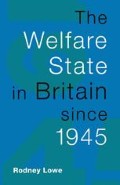Abstract
Education initially attracted as much popular enthusiasm as the NHS and, until the 1970s at least, it was more successful in attracting public finance. Its exceptional degree of political support was demonstrated by the fact that the 1944 Education Bill was the only major piece of reconstruction legislation to be enacted during the war and, in its wake, public opinion was recorded as providing ‘overwhelming support for extra expenditure on education’.1 The war thus reversed, if only temporarily, the widespread popular indifference — and even hostility — to education which had followed the introduction of compulsory schooling in 1880. Because of full employment, children’s earnings were no longer so vital to family income and consequently many parents were able for the first time to regard education not as a short-term financial loss but as an opportunity for their children to secure a good job and hence long-term financial security.
Preview
Unable to display preview. Download preview PDF.
Further Reading
The history of education has spawned a large and varied literature. It is best summarised in Roy Lowe, Education in the Postwar Years (1988), which covers the period to 1964,
and B. Simon, Education and the Social Order 1940–1990 (1991).
Additional information, particularly on unglamorous but essential issues such as curricula and examinations, is provided in P. Gosden, The Education System since 1944 (1983). The journal, History of Education, contains the latest research.
The war period is definitively covered by P. Gosden, Education in the Second World War (1976) and the same author, together with P. R. Sharp, has provided a good case-study of policy implementation in The Development of an Education Service: the West Riding, 1889–1974 (1978).
The issue of equality is covered incisively in M. Sanderson, Educational Opportunity and Social Change in England (1987)
and further education authoritatively in W. A. C. Stewart, Higher Education in Postwar Britain (1989).
The latter covers technical education, which has otherwise been as neglected by historians as by policymakers. C. Barnett in The Audit of War (1986) has led the offensive and two more balanced
but brief introductions are P. E. J. Landymore, ‘Education and industry since the war’, in D. Morris (ed.), The Economic system in the UK (Oxford, 3rd ed., 1985)
and J. Sheldrake and S. Vickerstaff, The History of Industrial Training in Britain (Aldershot, 1987).
The initial findings of more detailed historical research have been published in P. Summerfield and E. J. Evans, Technical Education and the State since 1950 (Manchester, 1990).
There is also a rich supply of contemporary literature. An insight into the earlier period is provided by O. Banks, Parity and Prestige in English Secondary Education (1955),
while the optimism of the 1960s is well captured in J. Vaizey, Education for Tomorrow (1962)
and R. Pedley, The Comprehensive School (1962).
The ambitions and frustrations of two reforming ministers of education, Sir Edward Boyle and Anthony Crosland, are recorded in M. Kogan (ed.), The Politics of Education (1971).
Finally, two excellent collections of primary sources, for official reports and educational research respectively, are J. S. Maclure, Educational Documents (5th ed., 1986)
and H. Silver, Equal Opportunity in Education (1973).
Copyright information
© 1993 Rodney Lowe
About this chapter
Cite this chapter
Lowe, R. (1993). Education. In: The Welfare State in Britain since 1945. Palgrave, London. https://doi.org/10.1007/978-1-349-22549-1_8
Download citation
DOI: https://doi.org/10.1007/978-1-349-22549-1_8
Publisher Name: Palgrave, London
Print ISBN: 978-0-333-44256-2
Online ISBN: 978-1-349-22549-1
eBook Packages: Palgrave Political & Intern. Studies CollectionPolitical Science and International Studies (R0)

